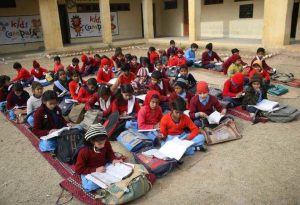
However, the teachers, who have served the department for over 16 years are no longer being recognised as state employees due to administrative loopholes. After recruiting the SSA teachers instead of filling up vacancies of master grade employees or head teachers, the government decided to promote the in-service SSA primary school teachers to the upper primary school (UPS) level, thus making them state employees and availing their services in SSA upgraded schools.
Due to this mix-up in the government policy, the protestors are now entitled to the benefits of the 7th pay commission. Speaking to NewsClick, journalist Rizwan Geelani, who is in talks with the teachers said, ‘the government cannot deny that these are state employees, but it made mistakes it is not acknowledging”.
This is not the only glitch by the J&K government. The government went ahead and treated the SSA appointees at par with the Rehbar-e-Taleemteachers, who were appointed on a contractual basis based on the fact that they had the highest qualification from a particular village. These teachers were also appointed with a promise that they would be regularised and absorbed in the department as permanent teachers. The mix up of the SSA policy with the Rehbar-e-Taleem, became an administrative failure by the J&K government.
Initial protests erupted in the state after PDP leader Syed Altaf Bukhari declined the 7th pay commission benefits to the SSA teachers. This led the enraged teachers to launch protests across the state, form committees to take up the issue politically and to find a solution once and for all. Speaking to NewsClick, Mohd. Yusuf Tarigami, MLA from Kulgam said, “the protesters’ demands are absolutely legitimate, they are looking for relief on three pressing issues, which is regular pay, benefits of the seventh pay commission and salary at par with the other teachers, but unfortunately their demands are consistently being ignored.”
In June this year, a delegation of about five-six members had approached the then CM Mehbooba Mufti, to demand the rightful benefits of the teachers. The CM had assured the teachers that their salaries would be provided in line with the seventh pay commission. She had also asked for a month’s time to resolve the issue. Adding to the woes of the teachers, in June 2018, governor’s rule was imposed in the state, thereby leading to new financial complications, triggering new demands. The teachers are now demanding that their salaries be delinked from the Ministry of Human Resource Development by the central government and given through the state fund as they are employees of the state. The financial roadblocks to the resolution of issues have increased. Geelani adds, ‘The government has recently merged the SSA scheme with the Samagra Shiksha Abhiyan, which is an overarching scheme that subsumes SSA, creating new problems with the allocation of finances for payments of the teachers and raising questions over which category the teachers will now fall in.”
The financial backlog for the payment of salaries of teachers is enormous. The government currently has to give salaries worth 900 hundred crores if the sixth pay commission is considered. In addition to this, if the benefits of the seventh pay commission are to be given to the protesting teachers the government will have to shell out approximately 1300 crore rupees.
The protests that are on for months in the valley have not yielded any substantial gains for the teachers. Yusuf Tarigami adds, ‘The protests show the failure of the vision of equal pay for equal work as these educators are denied their rights.’
The teachers serving the state for over a decade are not even recognised as state employees and are now victims of flawed decisions and administrative processes by successive regimes. Despite being recruited through the state’s recruitment agency Service Selection Board (SSB), the livelihood of close to five thousand teachers is at stake.




